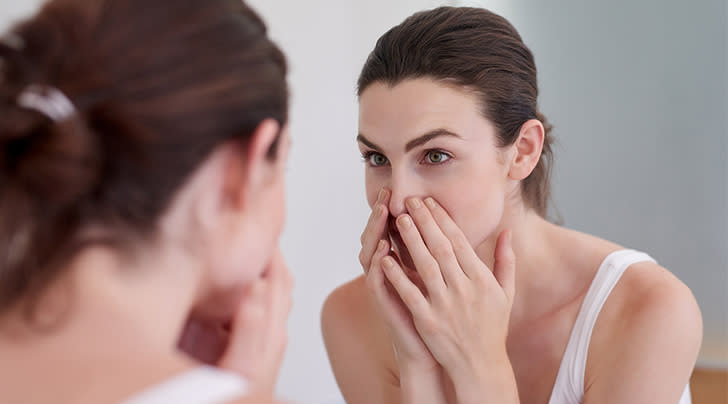A Comprehensive Guide on How to Minimize Pores

Before we go down the rabbit hole of how to minimize pores, we feel that it should be noted up top that you’re not actually shrinking their size; rather, you’re minimizing their appearance.
Pore size, like freckles, is genetic—meaning, the pores you’re born with are the pores you’ll die with. But before you get too depressed about this, know that there are a number of simple things you can do at home to make them look much smaller and tighter overall. Let’s get right to it then, shall we?
What can I do to make my pores look smaller?
The most important thing you can do is keep them clear. Clear pores are smaller and less-obvious, while clogged ones look enlarged and more noticeable. This means using the right products (and ingredients) and practicing good habits.
And of course, there are also products to avoid, but they’re very straightforward: any skin-care treatment or makeup that’s comedogenic. Always look for the words “non-comedogenic” and “oil-free” on labels.
What products should I use to keep my pores clear?
For starters, you’ll want to get a mild, non-comedogenic cleanser that you can use twice a day—once in the morning and once at night. (If you have acne, you can swap in a cleanser with salicylic acid, which can help clear your pores.)
According to our friends at the American Academy of Dermatology, the best way to cleanse your face is to use warm water and a gentle pressure (read: no scrubbing or tugging). This will ensure that your face is rid of excess oils without causing further irritation.
Next, you’ll want to incorporate an alpha or beta hydroxy acid into your skin-care routine. These chemical exfoliators help clear up any dead cells or debris (like residual makeup or oil) that are sitting on the surface of your skin; they also penetrate beneath the surface to dissolve the intercellular glue that holds cells together. Left on its own, this “glue” can build up and get lodged in your pores.
Not sure which one to use? AHAs are typically better tolerated by people with dry or sensitive skin, while BHAs are better suited for oily or acne-prone skin types.
Some of our favorite AHAs include: Goop G.Tox Malachite + AHA Pore Refining Tonic ($75); Drunk Elephant T.L.C. Framboos Glycolic Resurfacing Night Serum ($90).
And our go-to BHAs are: CosRx BHA Blackhead Power Liquid ($17); Paula’s Choice BHA Liquid Salicylic Acid Exfoliant ($30); Eminence Organic Skin Care Strawberry Rhubarb Hyaluronic Serum ($48); Reneé Rouleau BHA Clarifying Serum ($50)
What else can I do to help my pores?
For additional benefits, consider using a prescription retinoid or an over-the-counter product with retinol or retinyl palmitate. This vitamin A derivative works to decrease oil production while also increasing collagen production. What this means for you: clearer pores and firmer skin overall.
Though retinoids and retinols (which, in case you’re wondering, come from the same ingredient—just at different concentrations) are pretty much the closest thing to a miracle product we have available to us, they do come with a few drawbacks. Namely, they can cause irritation—especially in the beginning as your skin acclimates to the ingredient.
Every derm we’ve ever spoken to about this topic says the key to using retinol is to ease into it. Start by using it no more than once a week on just washed but completely dry skin. Use a pea-sized amount for your entire face and let it absorb for a few minutes before applying your moisturizer on top. Take note of how your skin reacts in the subsequent days; if there’s little to no irritation, you can gradually up your usage to twice a week and so on. If you get to a place where your skin can tolerate every other day, you’ve hit the maximum.
Some of our favorite retinol products: RoC Deep Wrinkle Night Cream ($25); Tata Harper Retinoic Nutrient Face Oil with Vitamin A ($48); Glow Recipe Avocado Melt Retinol Sleeping Mask ($49); SkinCeuticals Retinol 1.0 Maximum Strength Refining Night Cream ($88)
And on that note, you must be vigilant about your sunscreen.
Guys, we don’t need to tell you how important sunscreen is, right? In addition to protecting against sun damage (hello, dark spots and premature aging) and skin cancer, SPF is also crucial for keeping your collagen intact. Remember: More collagen means firmer skin and firmer skin means tighter-looking pores.
For optimal protection, wear a broad-spectrum sunscreen of SPF 30 or higher. Every. Single. Day. Yes, even on cloudy or snowy days and even when you’re just running a quick errand. Sunscreen is always a must, but it’s especially crucial when you’re using those aforementioned AHAs, BHAs or retinols, as those ingredients tend to increase sensitivity to UV rays. (We’re currently loving SuperGoop Mineral Matte Sunscreen SPF 40 because it’s lightweight and blends easily into our skin.)
With good skin-care practices in place, your pores will look much clearer, and in turn, smaller. (And if you still feel self-conscious about them, a spot of primer and concealer is always there to help.)

